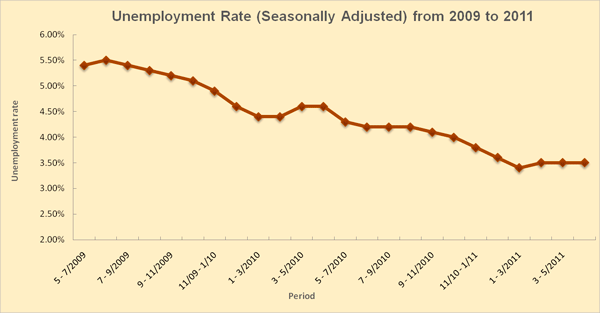Background Information
- The Hong Kong economy sustained strong momentum, with real GDP leaping by 7.2% in Q1 2011 over a year earlier, marking the fifth consecutive quarter that growth was distinctly above the average annual growth over the past 10 years.
- Unemployment rate fell successively from a peak of 5.5% in 2009 to 3.5% in Q2 2011. Wages and earnings continued to pick up. Labour wages rose by 4.9% year-on-year in March 2011. After discounting for inflation, it still registered a 0.2% gain in real terms. As for labour earnings, pay hikes in nominal and real terms were 7.2% and 3.2% respectively for Q1 2011 as compared to a year earlier. Average employment earnings for full-time employees in the lowest decile group also grew by 6.2% over the same period, with its real growth amounted to 2.0%.

- Poor population in Hong Kong shrank visibly by nearly 10% from nearly 0.84 million in 2009 to around 0.76 million in 2010 amid the economic recovery with improvements in employment and earnings. Recent CSSA caseload also demonstrated a stable downward movement. It declined from a high of 290,242 cases in August 2009 to 281,622 cases in June 2011, by 8,620 cases (or 3.0%).
- By dividing Hong Kong’s households into two equal halves of higher-income group and lower-income group based on their incomes, the ratio of their median household incomes in Q1 2011 was 3.7, slightly higher than the 3.5 recorded ten years ago (i.e. Q1 2001). Nonetheless, the median household incomes of both groups had increased, to $35,000 and $9,500 respectively over a year earlier.
- Income disparity (or wealth gap) and poverty are two distinct concepts. A rising Gini Co-efficient does not necessarily mean a worsening of the poverty situation, as both the rich and the poor may enjoy an income increase simultaneously, albeit at different rates. Various Government measures such as tax policies and social benefits will have the effect of facilitating social transfers and hence containing income disparity.
Measures Rolled Out in Recent Years
Encourage employment and enhance upward mobility
- Legislating for a minimum wage
- Implementing the Work Incentive Transport Subsidy Scheme
- Actively promote the development of social enterprises by introducing the Enhancing Self-Reliance Through District Partnership Programme
- Increasing the training places under the Employees Retraining Board
- Setting up a one-stop employment and training centre
- Disseminating vacancy and job fair information to job-seekers registered with the Labour Department via Short Message Service
- Launching a pilot scheme to install vacancy search terminals in non-governmental organisations in four remote districts
- Setting up the Recruitment Centre for the Retail Industry
Support the underprivileged
- Setting up of Community Care Fund
- Implementing short-term food assistance services
Children / Students
- Relaxing the income test mechanism of the Student Financial Assistance Agency
- Implementing the Subsidy Scheme for Internet Access Charges
- Increasing the flat-rate grant under the School Textbook Assistance Scheme and the flat-rate grant for selected items of school-related expenses payable to full-time primary and secondary students under the Comprehensive Social Security Assistance Scheme
- Improving the Pre-primary Education Voucher Scheme to provide enhanced support for kindergarten children
- Implementing 12-year free education
- Establishing the Child Development Fund
- Launching the Neighbourhood Support Child Care Project
- Launching the Comprehensive Child Development Service
Rehabilitation services
- Implementing the Pilot Bought Place Scheme for Private Residential Care Homes for Persons with Disabilities
- To continue to increase places of pre-school, day and residential care services
- Providing one-stop and district-based community support services through the District Support Centres for Persons with Disabilities
- Implementing the Pilot Scheme on Home Care Service for Persons with Severe Disabilities
Mental health services
- Establishing the Integrated Community Centre for Mental Wellness across the territory and enhance the manpower of these centres
- Enhancing psychiatric medical social services
- Implementing case management programme for persons with severe mental illness, and strengthen cooperation between the Hospital Authority and the Social Welfare Department for providing patients with intensive community support
- Expanding the service targets of the Early Assessment and Detection of Young Persons with Psychosis Programme to include adults
- Setting up Crisis Intervention Teams to handle emergency referrals at the community level and follow up on high-risk patients with mental illness
- Introducing the Integrated Mental Health Programme
- Using psychiatric drugs with less disabling side effects
New arrivals and ethnic minorities
- A dedicated team led by the Permanent Secretary for Home Affairs to step up efforts to assist the new arrivals and ethnic minorities to integrate into our community
Special education
- Expanding dedicated professional teams to strengthen support for children with autism or hyperactivity disorder, and provide their parents/carers with information on these two illnesses
- Providing early training and support for autistic children through pre-school rehabilitation services
- Implement a pilot scheme in mainstream primary and secondary schools to improve autistic students’ communication, emotion management and learning skills with a view to enhancing their learning effectiveness
Support to victims of family violence
- Implementing Victim Support Programme for Victims of Family Violence
|


